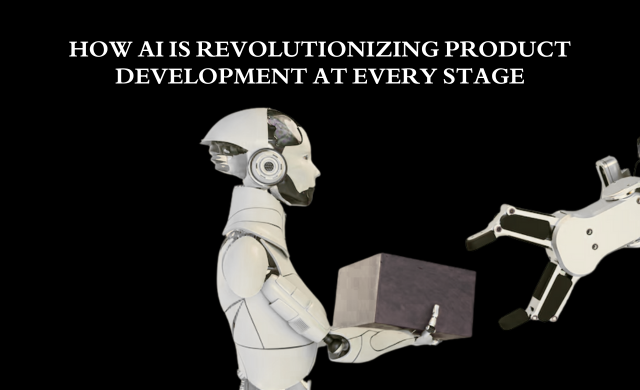How AI Is Disrupting Product Development and Innovation Cycles

Artificial Intelligence (AI) is rapidly transforming the landscape of product development and innovation. At Advait Labs, we’re at the forefront of this revolution, helping businesses harness AI’s potential to accelerate ideation, streamline prototyping, and enhance decision-making.
Understanding the Disruption: AI’s Strategic Role in Innovation
Traditionally, product development has been a time-consuming and resource-intensive process. From market research and conceptualization to prototyping and testing, the cycle could stretch over months or even years. AI in product development changes that. By introducing automation, predictive modeling, and real-time data analytics, AI enables faster and smarter decision-making at every stage of the product life cycle.
Key disruptions include:
- Automated Research & Trend Analysis: Natural language processing tools can scan thousands of research papers, patents, and consumer reviews to identify emerging trends and market gaps, helping teams make informed decisions early.
- Generative Design: AI algorithms propose design alternatives based on defined goals and constraints, often uncovering novel solutions humans might overlook. This accelerates design cycles and encourages innovation.
- Digital Twins and Simulation: Virtual replicas of products and systems enable rapid testing without the need for physical prototypes. Engineers can identify issues and optimize features before manufacturing.
- Predictive Analytics: Machine learning models forecast product performance, market reception, customer preferences, and even potential failure points, significantly reducing risk.
These applications of artificial intelligence in R&D make product innovation more scalable, accurate, and cost-efficient.
AI-Driven Speed and Agility
One of the most profound changes AI brings is speed. What once required weeks of development can now be reduced to days or even hours. For example, Advait Labs leverages custom-trained generative AI models to automate code generation, simulate product performance, and even generate customer-facing documentation in real-time.
This acceleration empowers startups and enterprises alike to:
- Iterate rapidly on design and function
- Shorten time-to-market
- Reduce R&D costs
- Launch minimum viable products (MVPs) more effectively
Moreover, AI in product development enables real-time feedback loops. User data is collected, analyzed, and used to inform continuous improvement of the product, creating a living innovation cycle. AI-driven innovation has become a vital element of agile development strategies. Machine learning in design now plays a crucial role in automating iteration and testing, enhancing precision while minimizing manual work.
Personalization and Customer-Centric Design
AI enables hyper-personalized experiences through behavioral analysis, predictive insights, and intelligent segmentation. Companies can now develop products that are not just functional but deeply aligned with individual user preferences and habits.
Examples include:
- Personalized health tech devices that adapt to user biometrics
- E-commerce platforms recommending highly specific product bundles
- Mobile apps adjusting UI/UX in real time based on user behavior
This level of personalization builds stronger customer loyalty and sets brands apart in competitive markets. It also reflects the growing role of intelligent automation in product success.
Collaborative Innovation: Human-AI Teams
AI isn’t replacing human creativity—it’s amplifying it. Cross-functional teams are now working with AI tools like ChatGPT, GitHub Copilot, and no-code/low-code platforms to:
- Brainstorm and validate ideas
- Prototype and test quickly
- Gather user feedback at scale
This shift is redefining team dynamics and enabling organizations to move faster while still tapping into the irreplaceable strengths of human insight, empathy, and strategic thinking. As a result, AI in product development is becoming a standard component of modern R&D.
Challenges and Considerations
While AI offers enormous potential, it’s not without challenges:
- Data Quality and Governance: Poor data leads to poor outcomes. Clean, diverse, and representative datasets are essential for effective AI.
- Ethics & Bias: AI systems can unintentionally reinforce societal biases. Responsible AI development must include fairness, transparency, and accountability to prevent unintended consequences.
- Integration Complexity: Embedding AI into legacy systems or traditional workflows can be technically challenging and may require cultural change across the organization.
- Security & Compliance: With the use of AI comes the responsibility to manage data privacy, especially in regulated industries such as healthcare, finance, and education.
The Competitive Edge: AI in Action
Businesses that adopt AI in product development stand to gain a significant competitive edge. For example:
- A consumer electronics company used AI to reduce design iterations by 40%, shortening their product launch cycle.
- A SaaS platform leveraged AI to personalize user onboarding flows, increasing activation rates by 30%.
- Advait Labs helped a manufacturing firm integrate digital twins into their R&D process, cutting prototyping costs by 50%.
These outcomes demonstrate that AI-driven innovation isn’t just about technology—it’s a business enabler. More companies are now exploring the role of machine learning in design and production to keep up with disruptive innovation AI is fueling.
Final Thoughts: The Future of Product Innovation
AI is not a trend—it’s a new paradigm. At Advait Labs, we believe the future of product development lies in intelligent automation, where AI augments human capabilities to drive innovation at unprecedented scale and speed.
Companies that embrace this shift will lead their markets. Those that don’t risk being left behind. The time to act is now. Integrate AI in product development to future-proof your innovation process.
Start your AI-driven innovation journey with Advait Labs today.
FAQs
1. How is AI a disruptive innovation?
AI transforms traditional processes by automating tasks, improving decision-making, and enabling entirely new business models, disrupting established industries.
2. How does AI affect product development?
AI speeds up product development through automation, predictive analytics, and smart design tools, reducing time-to-market.
3. How does AI affect innovation?
AI enhances innovation by uncovering new ideas, personalizing solutions, and enabling rapid experimentation.
4. What are examples of AI in product development?
Examples include generative design, digital twins, automated testing, and AI-powered customer insights.
5. Can AI replace human creativity in innovation?
No. AI complements human creativity by handling data-heavy tasks, freeing humans to focus on strategy and design.
